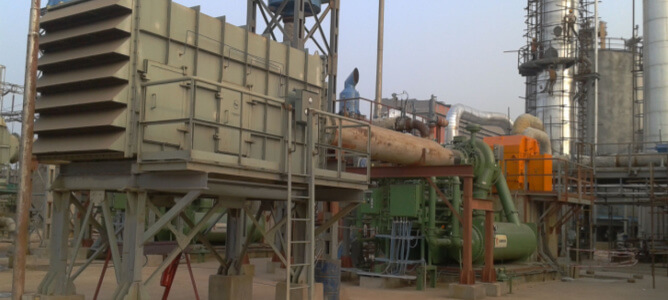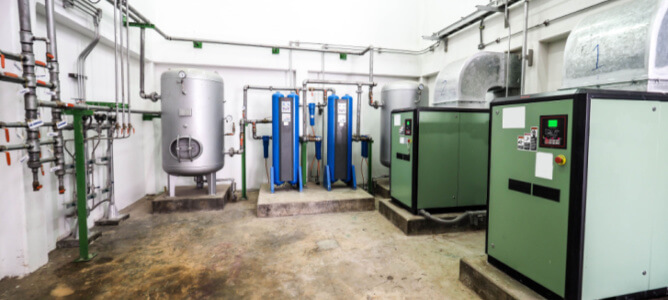
Understanding Different Types of Compressed Air Dryers
Compressed air dryers are critical to several industrial manufacturing processes. Food and beverage manufacturing, chemical compound synthesis, pharmaceutics, and oil and gas exploration are just a few that require dried compressed air for optimal productivity. The different types of air dryers available for use will be described further in this article.
What Is A Compressed Air Dryer?
A compressed air dryer is a piece of equipment that removes water vapor from air that has been pressurized for various industrial purposes. Compressed air dryers are virtually indispensable in a host of applications that are moisture sensitive. How does an air dryer work? Air dryers come in multiple configurations and operate in different ways.
Types of Compressed Air Dryers
The most commonly used air dyer systems are described below:
- Refrigerated air dryers
- Deliquescent air dryers
- Desiccant air dryers
- Chemical air dryers
- Membrane air dryers
Refrigerated Air Dryers
These dryers operate on the principle of condensation. Refrigerated air dryers cool compressed air to very low temperatures allowing moisture suspended in it to condense into its liquid form. Once the water has been removed, a dry stream of air can flow onwards to applications that require it.
Refrigerated dryers come as either cycling or non-cycling variants. Cycling refrigerated dryers operate similar to standard refrigerators supplying variable cooling according to demands. Non-cycling units provide constant cooling independent of demands, but this makes them a less efficient option.
Applications
Refrigerated air dryers are a popular choice for several manufacturing and service applications requiring compressed air with no detectable moisture. However, they are not suitable for highly sensitive applications where even little quantities of water can be detrimental.
Pros and Cons
Benefits of refrigerated air dryers include:
- Low setup costs
- Inexpensive to operate
- Resistant to airborne particle
Disadvantages include:
- Not ideal for operation at sub-zero temperatures
- Possess a marginal dew point capacity
Deliquescent Air Dryers
These dryers possess an absorptive mechanism that helps remove moisture from the air that passes through them. In addition, deliquescent dryers use hygroscopic salt tablets that require replacement when saturated.
Applications
Deliquescent dryers can be deployed effectively in hazardous, remote locations that require dry, pressurized air. Examples of applications that benefit from deliquescent dryer use include landfill sites and wood and asphalt manufacturing industries.
Pros and Cons
Key benefits of using deliquescent dryers include:
- Its ease of use in special conditions where contaminated air/waste gases are being handled
- Minimal maintenance requirements
- Does not require electricity to operate
Drawbacks of deliquescent air dryers are listed below:
- Hygroscopic drying material must be replaced regularly, leading to higher maintenance costs
- Dew point is variable depending on air temperature
Desiccant Air Dryers
Desiccant air dryers also use hygroscopic materials (silica gel, activated alumina) to achieve air drying. The absorption setup typically comprises a twin tower drying system with both chambers filled with desiccant materials.
During operation, one tower is actively drying air channeled through it while the second is in a regenerative state (desiccant saturated with moisture is being renewed for further use). Both towers switch back and forth between drying and regenerative phases throughout the operation cycles.
Applications
These types of compressed air dryers are advantageous in moisture-sensitive industrial and commercial applications, including:
- Mold prevention
- Healthcare/medication prescription environments
- Food processing
- Fabric manufacturing
- Ice rinks
Pros and Cons
Benefits of desiccant dryers include:
- Constant, low dew points
- Moderate operating costs
- Suitable for use in harsh, isolated environments
Disadvantages of desiccant dryer use include:
- Higher set up costs
- Air filtration needed to prevent desiccant degradation from suspended oils
- Purge air is often required
Chemical Air Dryers
These dryers utilize hygroscopic materials to achieve moisture removal from pressurized air. A typical setup is a drying unit that contains calcium chloride or lithium bead that pulls moisture out of the air stream passing through it. In addition, high-quality coalescing and particulate filters are often integrated to prolong the lifespan of the drying material.
Applications
Chemical dryers are a good choice for integrating moisture-sensitive chemical manufacturing and food processing applications.
Pros and Cons
Advantages of chemical air dryers include:
- Inexpensive setup/ongoing costs
- Minimal maintenance as there are no moving parts
- Require little monitoring
Disadvantages include:
- Replacement of drying chemicals is costly
- High-quality filtration systems are needed to maintain the usefulness of hygroscopic materials
- Chemical disposal is complicated and costly
Membrane Air Dryers
Membrane dryers are an efficient option for compressed air drying. They utilize specialized membranes containing microtubules to filter moisture out of compressed air. These microtubules retain water while a stream of the dried air is permitted to flow through to a collection unit or required application.
Applications
Membrane dryers are used in applications requiring dehumidification, food processing, and gas separation.
Pros and Cons
The benefits of using these types of air dryers include:
- Remote operation without the need for electricity
- Quiet operation, no moving parts
- Easy maintenance
Drawbacks of membrane air drying systems include:
- It can only be operated efficiently with clean air free of oil and particulate impurities
- Require regular filter changes to prevent blockages of filtration channels
Explore NiGen’s Line of Compressed Air Dryers
At NiGen, we offer the efficient moisture elimination solutions guaranteed to optimize your industrial processes. We have various types of air dryers and industrial air treatment systems available for purchase and rent, such as industrial air filtration systems, air compressor aftercoolers, and industrial air compressors.
To learn more about our different types of air dryers for compressors, please contact us online now.

